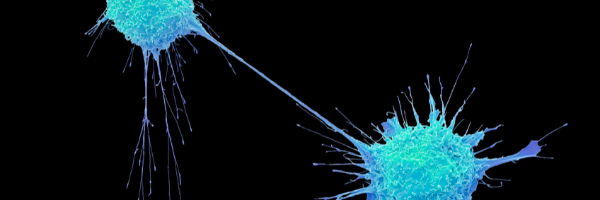What if I told you that years before someone found out they had cancer, we could draw their blood and find tumor cells shed from the primary tumor? And, after the primary tumor is removed with no surrounding cancer cells found on microscopic exam, no cancer cells found in nearby lymph nodes, no serum markers positive for the cancer and normal imaging studies, we could still draw blood and find tumor cells? One would be “tumor free” but not “cancer free”. These are called “circulating tumor cells” or CTCs and to understand cancer treatment and what true remission means, you need to know about them.
How Cancer Starts Video
Circulating Tumor Cells (CTCs)
Circulating tumor cells are cancer cells which have broken away from the primary tumor and entered the blood stream where they circulate and have the potential to generate metastatic disease. These cells can be isolated and identified and there is growing interest in their detection for the following purposes:
-
- detect early signs of a developing cancer,
- help to monitor existing cancers,
- produce an individual profile of which cancer drugs and which natural substances can be used to achieve the best treatment outcomes.
Cancer Stem Cells (CSCs) or Tumor Initiating Cells (TICs)
Circulating cancer stem cells represent a distinct subpopulation of CTCs that possess the tendency to cause metastatic disease. As compared to non-aggressive CTCs, circulating CSCs may be capable of evading primary tumor treatment, while also hiding from the immune system, surviving in the circulating blood and subsequently forming metastases in distant organs. Thus, circulating CSCs are characterized by their invasive characteristics and are potential therapeutic targets for preventing disease progression. When a cancer reoccurs it is these CSCs that have “sprouted”.
Advanced CTC testing and treatment
For over a decade we have used what I consider the most advanced and innovative lab in the world when it comes to CTC technology and treatment. Research Genetics Cancer Center (RGCC) Group was established in 2004 by Dr. Ioannis Papasotiriou. The company is a pioneering organization working in the fields of medical genetics and, in particular, cancer genetics, chemosensitivity and chemo-resistance testing and in Research and Development within the pharmaceutical industry via RGCC Pharma Ltd. The company headquarters are in Switzerland, and the brand new, state-of-the art laboratories in Northern Greece are equipped with the most up-to-date technological, advanced and innovative equipment. RGCC has performed over 1800 tests since 2004.
RGCC isolates the CTCs using a technology called flow cytometry in order to obtain a sample of 97-99% pure cells that are 99% viable for further testing, such as molecular analysis, immunophenotyping, gene expression assays and sensitivities to various agents. There are numerous new labs arriving on the CTC testing scene using various technologies, mostly providing only CTC counts and basic gene expression data.
RGCC Testing
Dr Rollins has been using the RGCC tests since 2013 and has trained extensively with RGCC. Test panels include gathering information about how many CTCs are present, genetic information about their tendency to be aggressive, resistant or prone to metastases, and sensitivity to chemotherapy or natural substances. This helps us develop a highly personalized treatment plan.
Advanced Treatments from RGCC
These therapies are very specific and made personally for each patient. This is truly personalized care at its finest, scientifically based and requires many steps to get the product made correctly.
Supportive Oligonucleotide Technique (SOT) has been shown to be a very supportive treatment for cancer. SOT has the ability to induce apoptosis (cell death) in CTCs, CSCs and primary tumor cells. From a blood sample the CTCs are identified then a small molecule call microRNA is developed to match exactly into the key portion of the cancer cell that controls cell death. The SOT in injected intravenously, spreads throughout the body including past the blood-brain barrier, embeds into the cancer and will disrupt the ability of the cancer to replicate. SOT has a stealth like ability to avoid destruction and will work 24/7 to fight cancer for as long as 6 months. Repeat blood samples are used to create new SOT molecules that account for cancer cell mutations.
Dendritic Cell Therapy or Immune Support Therapy, harnesses the power of dendritic cells by exposing them to CTCs from the blood of a patient with cancer, focusing the dendritic cells on antigen targets from the cancer cells. The dendritic cell population is then multiplied into millions of immune sentries and infused back into the patient. This stimulates the immune system to ramp up the attack on the cancer and also provides a long lasting immune memory that will keep the system vigilant in fighting the cancer.
VAX-Q-RE or Autologous Adoptive Cellular Therapy, is similar to dendritic cell therapy, but designed for more advanced cancers of at least stage 2B. Instead of the patients dendritic cells recognizing and determining the cancer cell antigen targets, the scientists need to use synthesized peptides designed specifically to mount an immune response against tumor proteins. This is due to the immune system being suppressed with more advanced cancers.
Videos
Jenny Hrbacek Story – Utilizing Advanced Cancer Testing from RGCC – as Health Self-Defense
Research links
Accuracy of RGCC testing methods
Circulating tumor cells: a multifunctional biomarker
Circulating cancer stem cells: the importance to select
Circulating tumor cells versus imaging–predicting overall survival in metastatic breast cancer
Author
Scott Rollins, MD, is Board Certified with the American Board of Family Practice and the American Board of Anti-Aging and Regenerative Medicine. He specializes in bioidentical hormone replacement for men and women, thyroid and adrenal disorders, fibromyalgia and other complex medical conditions. He is founder and medical director of the Integrative Medicine Center of Western Colorado (www.imcwc.com) and Bellezza Laser Aesthetics (www.bellezzalaser.com). Call (970) 245-6911 for an appointment or more information.


